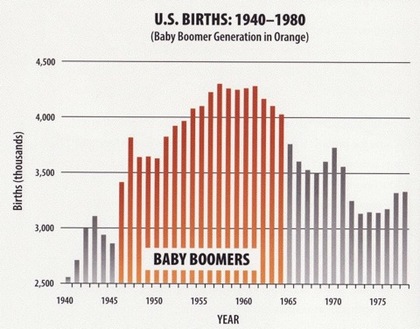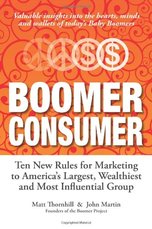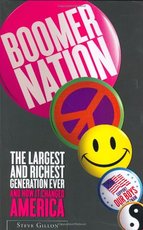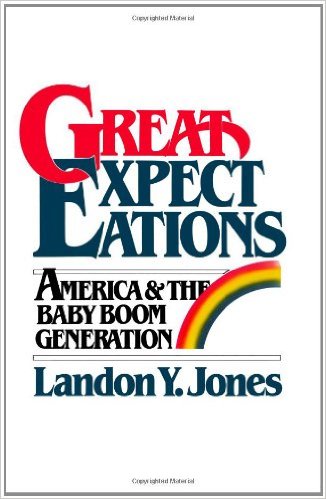For everyone interested, this is the place to find the key ingredients, the fundamental characteristics, and the best compilation of information on not just a few, but all aspects of American Boomerdom.
For my fellow Boomers, this is the place to learn how being a part of this extaordinary generation impacts our lives, careers/businesses, the greater society, our children, and the country.
For my fellow Boomers, this is the place to learn how being a part of this extaordinary generation impacts our lives, careers/businesses, the greater society, our children, and the country.
Welcome to my site....
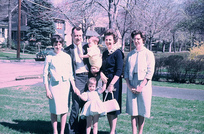
Whereas you will easily find experts on this generation who understand isolated aspects of its experience and immense impact - some well-versed in marketing to Boomers, some in Boomer life transitions, yet others in how Boomers influence the work place -
here you can learn about us across all life/societal areas.
We start on this page with the generation's key characteristics - the overview, or what we call the basics - then move into the specifics of each life area in the sites pages: from working to parenting; from gender-specific issues to how we have redefined everything from aging to retirement.
Terri Benincasa,
The Boomer Expert
BABY BOOMERS
"...person(s) born during a baby boom, esp. that following WWII"
(The Oxford Dictionary)
"Individuals born between 1946 - 1964"
(US Census Bureau)
"The societal force that permanently changed the values and culture of the United States in the last half of the twentieth century, and for generations to come"
(Terri Benincasa)
We'll Start with Some Boomer Statistics...the real ones
(vs. the variety of those less accurate that proliferate the internet):
- Boomer Birth Years: 1946-1964 according to the US Census Bureau & Department of Labor
- Generation's size: Approximately 78 million (measuring from those born during the above years, some of whom are no longer with us...)
- The term "baby boomer": coined by Landon Jones, in his 1980 book Great Expectations: America and the Baby Boom Generation
- Gen X: children born between 1965 and 1976 to the first wave of Boomers
- Gen Y (also known as Millennials): children of the middle/younger group of Boomers and born between 1977 and 1992 (according to Pew Research)- this has been broadened mostly in the media to include those born up to 2004 which is demographically incorrect; the term Millennial was coined to define children who would come of age in the new millennium
- Boomers are the largest generation in the US making up 24.3% of the total population, have a history of being societally transformational (think sexual/equity/environmental "revolutions" of the '60's/'70's), and will influence societal norms for years if not decades to come; "As boomers go through the stages of life, they change everything they touch," (William Frey, a senior fellow specializing in demographics at DC's Brookings Institution).
- The 65+ population segment is projected to double to 71.5 million by 2030 (the last Boomers will turn 65 in 2029), and grow to 86.7 million by 2050.
The first Boomer

Born one second past midnight on Jan. 1, 1946, Kathleen Casey-Kirschling (known to all as Kathy Casey) became the first Baby Boomer to be born in the United States.
As a result of her unintended fame, the world watched when she turned 40, 50 and 60 & when she filed for Social Security benefits.
In a 2006 interview with USA Today, she said, "I don't feel like I am a spokesman for the generation, but I have just a little part of every part of the generation in me. I am definitely a Baby Boomer, in the true sense of the word– the good and the bad."
We're proud to have you, Kathleen!
As a result of her unintended fame, the world watched when she turned 40, 50 and 60 & when she filed for Social Security benefits.
In a 2006 interview with USA Today, she said, "I don't feel like I am a spokesman for the generation, but I have just a little part of every part of the generation in me. I am definitely a Baby Boomer, in the true sense of the word– the good and the bad."
We're proud to have you, Kathleen!
...Now, On to Generational Characteristics:
We are the first "coddled" generation across all economic strata

No generation before us has experienced such a majority of its members, from all economic backgrounds, experiencing more opportunities and consistently better lifestyles than that of their parents, as did Boomers.
Boomers were raised to believe that we deserve better than our parents, and by golly, we agreed! Boomers' parents, almost all being members of the "greatest generation" (even those of the youngest Boomers, now ages 47-50; the vast majority have parents in their mid 70's, the end of that generation, because these Boomers tend to be the youngest in their family), wanted us to have the best, and went to great lengths to ensure we got it.
Upside: We are unafraid to seek out and get what we want and need, to aspire to our greatest fulfillment
Downside: Our tolerance for sacrifice is limited, and geared more to sacrificing for the attainment of "things."
Boomers were raised to believe that we deserve better than our parents, and by golly, we agreed! Boomers' parents, almost all being members of the "greatest generation" (even those of the youngest Boomers, now ages 47-50; the vast majority have parents in their mid 70's, the end of that generation, because these Boomers tend to be the youngest in their family), wanted us to have the best, and went to great lengths to ensure we got it.
Upside: We are unafraid to seek out and get what we want and need, to aspire to our greatest fulfillment
Downside: Our tolerance for sacrifice is limited, and geared more to sacrificing for the attainment of "things."
~~~~~
We're all about change

No group has and continues to propel positive, life-changing sociological change more than the Baby Boomer Generation.
Boomers as a generation began our adulthood propelling more major societal changes than any other generation before, or after us. And we are still experiencing, and spurring, major shifts in thinking and doing, from redefining aging, relationships, and retirement, to compelling the need for businesses to prepare for the yawning knowledge gap created when we do decide to retire.
Upside: Our redefining of outdated societal notions such as going quietly into the sunset in one's sixties (or for that matter, what "old" is in general), will greatly benefit not just us, but all generations that come after us
Downside: We can at times think and act like perpetual adolescents, or use our great influence in ways that don't benefit the common good.
Boomers as a generation began our adulthood propelling more major societal changes than any other generation before, or after us. And we are still experiencing, and spurring, major shifts in thinking and doing, from redefining aging, relationships, and retirement, to compelling the need for businesses to prepare for the yawning knowledge gap created when we do decide to retire.
Upside: Our redefining of outdated societal notions such as going quietly into the sunset in one's sixties (or for that matter, what "old" is in general), will greatly benefit not just us, but all generations that come after us
Downside: We can at times think and act like perpetual adolescents, or use our great influence in ways that don't benefit the common good.
~~~~~
We're very much into control

Ann Clurman of The Futures Company, an entity that tracks consumer attitudes to forecast lifestyle and behaviors, and author of "Generation Ageless: How Baby Boomers Are Changing the Way We Live Today says it best: "Boomers have a hard time giving up control. For them, control is a fundamental right born out of basic entitlement... they grew up in a time of unprecedented economic prosperity and a basic feeling that the struggle for survival was over."*
Upside: We are unafraid to take charge of important things like holding our legislators accountable, or our healthcare (ex: we are the first generation to see ourselves as partners with our doctors in healthcare decisions vs. meekly following whatever the doctor tells us, for our parents, too)
Downside: In our determination to control what's around us, we can at times think we know all when in fact we don't...made worse by what Social Psychologists call "confirmation bias" - the tendency for people to favor information that confirms their preconceptions or biases, regardless of whether that information is true.
Upside: We are unafraid to take charge of important things like holding our legislators accountable, or our healthcare (ex: we are the first generation to see ourselves as partners with our doctors in healthcare decisions vs. meekly following whatever the doctor tells us, for our parents, too)
Downside: In our determination to control what's around us, we can at times think we know all when in fact we don't...made worse by what Social Psychologists call "confirmation bias" - the tendency for people to favor information that confirms their preconceptions or biases, regardless of whether that information is true.
*as reported by Emanuella Grinberg, CNN Living, May 9, 2011
~~~~~
We are extremists

A prime example is our generational approach to parenting; we swing extremely from parents of "latch-key kids" (upper-end Boomers) to "helicopter parents" (Boomers at the youngest end of the generation's spectrum). We took our aversion to our parents' admittedly less than admirable approach to some things, such as sacrificing beyond what is needed to ensure solvency (for many almost scrooge-like), or staying in bad marriages even after the kids are grown, to equally dysfunctional extremes: We almost eliminated the word "sacrifice" from our lexicon, and have made divorcing a normal part of the marriage pact. As reported in the Washington Times, a 2014 Gallup poll showed that of those Boomers who were "flower child, free love hippies" in their youth, 44% are now conservatives (also see "we're getting more conservative as we age" below). From one extreme to the other....
Upside: There actually may not be much of one for this characteristic; operating in extremes tends to be the best way to ensure poorer outcomes
Downside: Listed in the paragraph above.
Upside: There actually may not be much of one for this characteristic; operating in extremes tends to be the best way to ensure poorer outcomes
Downside: Listed in the paragraph above.
~~~~~
We are at once pessimistic & optimistic (those extremes again)...

....And that can be confusing - to pollsters, our kids & grandkids, and to us.
Many have mis-characterized our 1960's/'70's protests, and zeal for societal change, as driven by total optimism. In fact, we were in part pessimistic & mistrustful; about the war, about our government & corporate leader's motivations, about the state of our environment. But, our "flower power" was about optimism; for a better world, for the idea love that can conquer hate, for the notion of true equality across races and genders, most importantly, for out belief in ourselves to create change.
In many ways, we feel no differently today, as demonstrated by a recent AARP poll of 3500 Boomers - on the one hand, results showed respondents to be unhappy with the way their lives turned out; at the same time they're optimistic about the future. Yep, that's us, unhappy but optimistic anyway.
Upside: the combination can lead to a balanced approach; of a belief in a better today and tomorrow for all, but through a more realistic path to achieving it.
Downside: Due to our inherent extremism described above, we too easily give in to one side of ourselves or the other, an either/or proposition, rather than feeling comfortable with this dichotomy, and using it to our and others' best advantage.
Many have mis-characterized our 1960's/'70's protests, and zeal for societal change, as driven by total optimism. In fact, we were in part pessimistic & mistrustful; about the war, about our government & corporate leader's motivations, about the state of our environment. But, our "flower power" was about optimism; for a better world, for the idea love that can conquer hate, for the notion of true equality across races and genders, most importantly, for out belief in ourselves to create change.
In many ways, we feel no differently today, as demonstrated by a recent AARP poll of 3500 Boomers - on the one hand, results showed respondents to be unhappy with the way their lives turned out; at the same time they're optimistic about the future. Yep, that's us, unhappy but optimistic anyway.
Upside: the combination can lead to a balanced approach; of a belief in a better today and tomorrow for all, but through a more realistic path to achieving it.
Downside: Due to our inherent extremism described above, we too easily give in to one side of ourselves or the other, an either/or proposition, rather than feeling comfortable with this dichotomy, and using it to our and others' best advantage.
~~~~~
We're self-centric

The downside of this one we hear much about because it makes for good media ratings, but is a mere half truth.
Upside: We understand the importance of aiming for the highest level of Maslow's Hierarchy, self-actualization (this entails such admirable capacities as embracing interdependence, a full balancing of care for self and others, elimination of the need for self-aggrandizement to feel worthy)
Downside: We fall far short of that goal, landing instead on the rung of that chart immediately below, the Esteem level, and at the low end of it (thus the term "low self-esteem"); as a result, we look to all the wrong indicators for measuring our self-worth (how many things we possess and how much those things cost....)
Upside: We understand the importance of aiming for the highest level of Maslow's Hierarchy, self-actualization (this entails such admirable capacities as embracing interdependence, a full balancing of care for self and others, elimination of the need for self-aggrandizement to feel worthy)
Downside: We fall far short of that goal, landing instead on the rung of that chart immediately below, the Esteem level, and at the low end of it (thus the term "low self-esteem"); as a result, we look to all the wrong indicators for measuring our self-worth (how many things we possess and how much those things cost....)
~~~~~
...And the adjunct to our self-centricity...

...we want what we want when we want it...
I mentioned in the "coddled" category that our parents brought us up to believe that we deserve the best - and that the kind of sacrifice they accepted to make that happen is something that to too great an extent bypassed our generation.
Where they tended to turn needs into wants in order to ensure our better future, we tend to turn wants into needs to justify our spending habits, as we seek all those material things on which we, unfortunately, too often base our worth as people.
Additionally, in the 1990's, social psychologists developed a theory called "depleteable self-control" positing that individuals' capacity to exert self-control is not infinite, and that when we exert willpower in one area, we become less able to then exert it in others. More recently it's come to include trade-off decisions, such as choosing between making more money and having more leisure time (for Boomers, this is germane to time with the family, time taken to volunteer, etc.). This one-two punch, of our generational DNA programmed to always seek bigger and better combined with a human capacity limitation, goes a long way toward explaining our inability (read lack of will-power) to save; our ability to rationalize our spending ways.
I mentioned in the "coddled" category that our parents brought us up to believe that we deserve the best - and that the kind of sacrifice they accepted to make that happen is something that to too great an extent bypassed our generation.
Where they tended to turn needs into wants in order to ensure our better future, we tend to turn wants into needs to justify our spending habits, as we seek all those material things on which we, unfortunately, too often base our worth as people.
Additionally, in the 1990's, social psychologists developed a theory called "depleteable self-control" positing that individuals' capacity to exert self-control is not infinite, and that when we exert willpower in one area, we become less able to then exert it in others. More recently it's come to include trade-off decisions, such as choosing between making more money and having more leisure time (for Boomers, this is germane to time with the family, time taken to volunteer, etc.). This one-two punch, of our generational DNA programmed to always seek bigger and better combined with a human capacity limitation, goes a long way toward explaining our inability (read lack of will-power) to save; our ability to rationalize our spending ways.
~~~~~
We live a kind of perpetual adolescence...

You may have heard of the "Peter Pan Syndrome" - it was a term made popular after the book by the same name by Dr. Dan Kiley was published in 1983. Although written primarily about Boomer men who refuse to grow up, like the JM Barrie character of the same name, it applies to the entire generation.
Some hallmarks of adolescent behavior are: risk-taking, a belief that one is indestructible, rebelliousness, and listening to one's peers or celebrity-type figures rather than authority figures/experts. Add to that the fact that as a generation, we want what we want when we want it just like a healthy adolescent, we try to act and look much younger, and we want respect but aren't the best at earning it, you can see we fit the bill pretty well.
Upside: We don't act "old", we are open to new things/learning/exploring, we're a boon for the joint replacement industry to we keep lots of people employed, and generally we turn the idea of "aging" & "retiring" (as in "slowing down") on its head.
Downside: Some of the risks we take are deadly (HepC & HIV are growing problems for Boomers), we do like a fine whine vs. thoughtful dialogue/debate, and we tend to deflect responsibility (so much of what happens to us "isn't our fault", ya' know?!).
Some hallmarks of adolescent behavior are: risk-taking, a belief that one is indestructible, rebelliousness, and listening to one's peers or celebrity-type figures rather than authority figures/experts. Add to that the fact that as a generation, we want what we want when we want it just like a healthy adolescent, we try to act and look much younger, and we want respect but aren't the best at earning it, you can see we fit the bill pretty well.
Upside: We don't act "old", we are open to new things/learning/exploring, we're a boon for the joint replacement industry to we keep lots of people employed, and generally we turn the idea of "aging" & "retiring" (as in "slowing down") on its head.
Downside: Some of the risks we take are deadly (HepC & HIV are growing problems for Boomers), we do like a fine whine vs. thoughtful dialogue/debate, and we tend to deflect responsibility (so much of what happens to us "isn't our fault", ya' know?!).
~~~~~
...And an adjunct to Perpetual Adolescence; we codified "style over substance"

Our parents may have started this trend as the first generation to normalize celebrity idolatry with the advent of motion pictures as an entertainment staple, but we took it from the small part of life that it was for them, to a way of life for us.
It began with our disdain for "dressing" to go anywhere, from the theatre to church, thus removing substance from our wardrobe; we moved it along by removing substance from our viewing tastes, replacing Dick Cabot with Geraldo and Springer, and driving our nation's growing preference for "reality TV" over well-written weekly shows; and finally, it's culminated in "fluff" becoming the basis for many highly important decisions we make, from values to voting, relying on pundit opinions rather than researched fact. We have clearly established our demand for ever greater sensationalism over quality, including our value of unrealistic body types, youthfulness as the only chic, and when it comes to voting, we respond well to political messages with no basis in truth.
It began with our disdain for "dressing" to go anywhere, from the theatre to church, thus removing substance from our wardrobe; we moved it along by removing substance from our viewing tastes, replacing Dick Cabot with Geraldo and Springer, and driving our nation's growing preference for "reality TV" over well-written weekly shows; and finally, it's culminated in "fluff" becoming the basis for many highly important decisions we make, from values to voting, relying on pundit opinions rather than researched fact. We have clearly established our demand for ever greater sensationalism over quality, including our value of unrealistic body types, youthfulness as the only chic, and when it comes to voting, we respond well to political messages with no basis in truth.
~~~~~
We're the first "sedentary" generation, & the first to have high rates of obesity
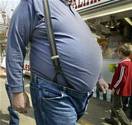
According to a February, 2013 report published in JAMA Internal Medicine:
52% of Boomers reported no regular physical activity, up from 17% in our parents' generation
39% of Boomers are obese compared to 29% of our parents.
Unfortunately, we've passed this tendency onto our progeny
52% of Boomers reported no regular physical activity, up from 17% in our parents' generation
39% of Boomers are obese compared to 29% of our parents.
Unfortunately, we've passed this tendency onto our progeny
~~~~~
We're the first generation in modern history to borrow and spend beyond our means

The reason for this is best explained by Seeking Alpha's Larry Trefz:
"As prices of assets and commodities sank (through the Great Depression), deflation became the Greatest Generation's reality. Dollars became more valuable and it seemed that the longer they saved their money the more purchasing power it had.
After WWII, and into the '50s the Federal Reserve practiced an easy monetary policy in an attempt to revive the economy. The economy came back to life and by the time the Baby Boomers were in their early adulthood, inflation was the name of the game.
The difference between being raised in a deflationary environment vs. an inflationary one caused a significant difference in the perceptions of and...relationship (with) money. The parents of the Boomers, having experienced deflation (seeing that their dollars increased in purchasing power), were comfortable saving their money and being conservative in their consumer spending...Boomers who experienced the inflation (seeing their dollars decrease in purchasing power) of the '70s...developed an attitude of "spend it now, before it's worthless".
Thus we turned holding high levels of debt into the new chic, spending not saving into our way of life, and, for the first time in modern history, have left our progeny worse off than we are.
"As prices of assets and commodities sank (through the Great Depression), deflation became the Greatest Generation's reality. Dollars became more valuable and it seemed that the longer they saved their money the more purchasing power it had.
After WWII, and into the '50s the Federal Reserve practiced an easy monetary policy in an attempt to revive the economy. The economy came back to life and by the time the Baby Boomers were in their early adulthood, inflation was the name of the game.
The difference between being raised in a deflationary environment vs. an inflationary one caused a significant difference in the perceptions of and...relationship (with) money. The parents of the Boomers, having experienced deflation (seeing that their dollars increased in purchasing power), were comfortable saving their money and being conservative in their consumer spending...Boomers who experienced the inflation (seeing their dollars decrease in purchasing power) of the '70s...developed an attitude of "spend it now, before it's worthless".
Thus we turned holding high levels of debt into the new chic, spending not saving into our way of life, and, for the first time in modern history, have left our progeny worse off than we are.
These characteristics span the entire 18 years
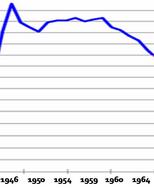
Another media-fueled misconception is that the generation is too vast for our entire group to have key things in common.
Not true.
We were all raised by the same "greatest generation" parents, and the vast majority of younger Boomers had older Boomer siblings; the combination trends toward even those born in 1964 having been influenced by the same dynamics and sociological imperatives that influenced the upper end of the generation.
In a 12/31/13 interview with CNN's The Lead with Jake Tapper, journalist P.J. O'Rourke, author of The Baby Boom, tells us that what essentially ties all Baby Boomers together "is being raised in an era of peace, prosperity, economic growth, stability, and optimism."
Our generation's experiences were so profound, our influence so extraordinary, that both easily inculcated the lives and thinking of our youngest members.
Not true.
We were all raised by the same "greatest generation" parents, and the vast majority of younger Boomers had older Boomer siblings; the combination trends toward even those born in 1964 having been influenced by the same dynamics and sociological imperatives that influenced the upper end of the generation.
In a 12/31/13 interview with CNN's The Lead with Jake Tapper, journalist P.J. O'Rourke, author of The Baby Boom, tells us that what essentially ties all Baby Boomers together "is being raised in an era of peace, prosperity, economic growth, stability, and optimism."
Our generation's experiences were so profound, our influence so extraordinary, that both easily inculcated the lives and thinking of our youngest members.
We're Getting More Conservative As We Age...

...But No Less Influential
Here's the biggees of Boomer research:
The best...and their works
Matt Thornhill/John Martin Steve Gillon, PhD P.J. O'Rourke Landon Jones
